Movie heroes who decided to take justice into their own hands (13 photos)
A selection of films where the heroes, due to the inaction of the law or for some other reasons, took justice into their own hands and began to take revenge. Add your options in the comments. 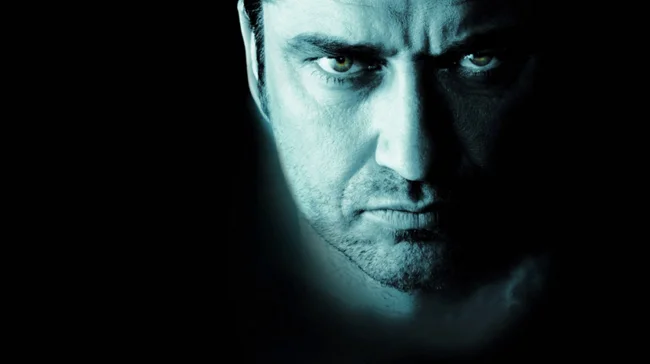
If the court and the police do not punish the criminals, then the victims take up arms. Movies about national avengers are always controversial - on the one hand, the audience sympathizes with those who were offended, on the other - where is the line between crime and revenge?
"Law Abiding Citizen" (2009)
What must happen for a law-abiding citizen and exemplary family man to become a cold-blooded killer? The film answers this question logically and in a straightforward manner. Throughout the film, the viewer wonders what he would do in the place of the main character - and even by the end of the film he is perplexed: who is right? 
A routine robbery turns into brutal rape and murder when criminals break into the home of Clyde Shelton (Gerard Butler). In front of the father of the family, they mock his wife and daughter. Wounded by a knife, he can do nothing to help his family. Despite the fact that the killers are quickly found, there is not enough evidence of their guilt for serious punishment.
Nick Rice (Jamie Foxx), fearing to lose the case, makes a deal with one of the criminals to testify against his partner. In return, he receives a short prison sentence and is released. Shelton does not agree, but understands that he will achieve nothing more legally. Then he decides to punish not only everyone involved in the case, but also, at the same time, those representatives of the law who turn a blind eye to injustice.
Fact: Butler was originally slated to play Rice and Foxx played Shelton. Butler, a lawyer by training, was more suited to the role of assistant prosecutor than anyone else. But, according to one version, Fox simply invited Butler to switch roles, and he agreed.
"Game of Survival" (2012)
The film “Game of Survival” is an absolutely studio project. Director Heitor Dalia admitted that he was not allowed to participate at any stage of preparation. He didn't even see the actors at the auditions. At some point, Dalia already wanted to cut his name out of the credits, but towards the end of the filming process he changed his mind. 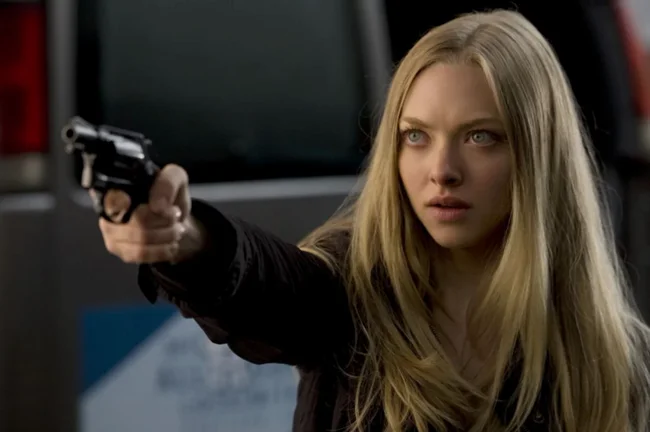
No one believes Gillian (Amanda Seyfried), but she tells the truth. One night a maniac broke into her house and kidnapped her. He put the girl in a deep hole in a huge park in Portland, at the bottom of which Gillian found the remains of the killer's previous victim. Armed with a human bone, the girl was able to wound her attacker and escape. However, the police don't believe her.
Law enforcement officials cannot find a hole in the park, a maniac, or any evidence of a crime. The matter is aggravated by the fact that the girl actually spent some time in a psychiatric clinic after the death of her parents. The police conclude that she only imagined it. Soon, Gillian's younger sister disappears. The detectives do not respond to the statement, and the girl has to look for the criminal herself in order to return her sister.
Fact: The authors focused on how police officers respond to the testimony of those who have ever had mental health problems. The plot once again confirms that the distrust of legal representatives towards victims only gives rise to new crimes.
"Sleepers" (1996)
The film “Sleepers” was based on the book of the same name by Lorenzo Carcaterra. Later, the author admitted that the events described in the novel actually happened to him. However, journalists could not find any confirmation of this.
To all questions, the writer answered that he had replaced all names, dates and titles. The director, producer and screenwriter of the film, Barry Levinson, took Carcaterra's side. He said more than once that he believed the writer, the whole story looked too realistic. Levinson was also sure that no one would involve his name in such a terrible story for the sake of popularity or monetary gain. 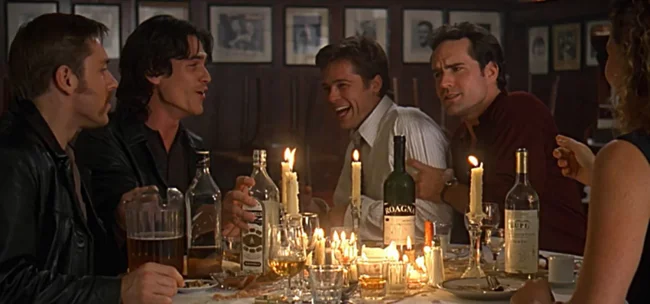
Four New York friends, connected by a difficult childhood, relax in a pub. Unexpectedly, they recognize the local security guard as an old offender, Sean Knox (Kevin Bacon). Many years ago, due to a tragic accident due to the fault of the boys, a man died. As punishment, the children were sent to a correctional colony. At that time, Knox worked there as a supervisor, who, together with his colleagues, abused the boys.
Friends remember a terrible past filled with violence, including sexual, from sadistic guards - and Knox is killed in front of witnesses. Although it is obvious that this is a triumph of justice, from the point of view of the law it is an ordinary murder for which someone must be punished.
Fact: the creators managed to gather an amazing number of stars in the film - in addition to Bacon, Robert De Niro, Dustin Hoffman, Brad Pitt, Billy Crudup, Minnie Driver starred in the film. Bacon's role involved mostly filming with child actors; his character was so disgusting that it was extremely difficult for his co-stars to communicate with him even behind the camera.
"Voroshilovsky shooter" (1999)
The drama “The Voroshilov Shooter” is based on the story “A Woman on Wednesdays” by Viktor Pronin. The author used for the book the real story of Dmitry Danilov, whose girlfriend was raped by hooligans while he was in the army. The beloved could not stand the shame and committed suicide, while the police were in no hurry to investigate.
Returning from the army, Danilov decided to organize lynching. But since he did not know the identity of the criminals, the young man wandered through the criminal areas of Moscow and beat up hooligans, especially those who harassed women. Before he was caught, he managed to kill two and maim several more. Despite the fact that the relatives of the killed and injured asked for a life sentence for him, Danilov was sentenced to 15 years. 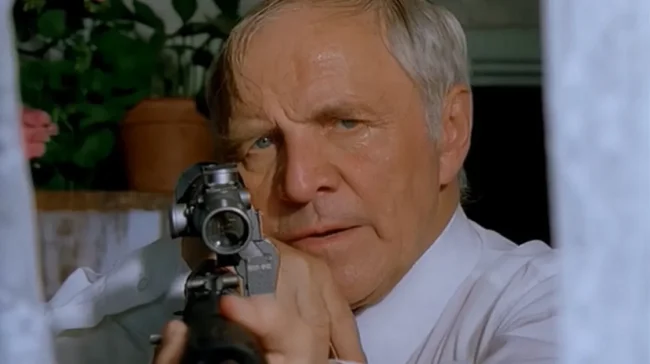
The outline of the film echoes real events - only the plot is based on a grandfather and granddaughter, who was raped for fun by three representatives of the local golden youth. The girl reports to the police, but one of the detainees is the son of a colonel, so the case is quickly closed and the hooligans are released.
A broken girl withdraws into herself. Then her grandfather, Ivan Afonin (Mikhail Ulyanov), decides to take revenge on the offenders. A war veteran sells a house in the village and buys a sniper rifle.
Fact: The film received mixed reviews. The director of “The Voroshilov Shooter,” Stanislav Govorukhin, was accused of justifying and romanticizing lynching. And the audience fell in love with the old man Afonin and filled up the actor Ulyanov with bags of letters with declarations of love and respect for the actions of his hero.
"Lollipop" (2005)
The idea for the film "Lollipop" belongs to producer David Higgins. One day he saw a story about Japanese schoolgirls who lured elderly businessmen with a soft spot for teenagers, attacked and robbed them. Higgins decided to develop the story and hired Brian Nelson to write the script. 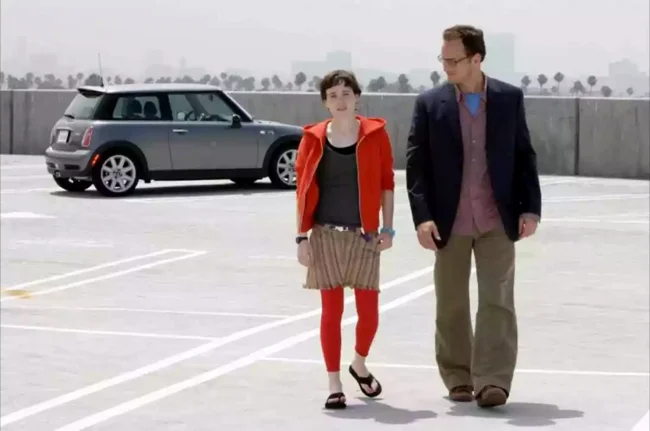
“Strangers shouldn’t talk to little girls” is the thriller’s ambiguous promotional tagline. 14-year-old Hayley (Ellen Page) meets 32-year-old Jeff (Patrick Wilson) online. Virtual communication is growing into real communication. From the cafe the couple goes to Jeff's house, but the evening ceases to be languid when it turns out that Haley understands who she is dealing with. The girl has a plan - she will take revenge on the pedophile.
Concerns about the young, innocent girl, who is about to become the next victim of a pervert, are replaced by feelings of horror from what is happening. The filmmakers ingeniously play on the public's nerves, hinting that it is quite possible that Hayley is mistaken, and Jeff is her innocent victim.
Fact: In the film, actor Peter Wilson shouts, "You can't shoot me," in a scene on a rooftop. After the next take, the neighbors called the police, deciding that a crime was actually happening before their eyes.
"Brave" (2007)
Jodie Foster accepted the lead role in Brave when she learned that her character would not be a typical victim of crime, but would turn into a woman who took life into her own hands. The actress herself made several additions to the script in order to better convey to the public what it meant for the heroine to walk the streets freely and safely. So her character from a writing journalist turned into a radio host who travels around New York, “collecting” stories of her beloved city. 
What is a woman capable of when three hooligans deprive her of everything that was dear to her? Correct answer: revenge. When the law is in no hurry to punish criminals, the victim himself takes up arms. Erica (Jodie Foster) is a successful modern woman. She works in radio and is about to marry David (Naveen Andrews).
Another walk with the dog ends tragically - hooligans beat Erica's fiancé to death, and she ends up in the hospital. After leaving the hospital, she realizes that life will never be the same. She has lost everything and is now even afraid to walk around her once beloved city. Erica can be given courage by a pistol, which she urgently buys on the black market. The weapon in her hand makes the heroine so brave that she is now ready to take revenge on the criminals.
Fact: the film was received ambiguously - on the one hand, Jodie Foster was nominated for a Golden Globe, on the other - critics wrote that the film justifies violence. The role of Erica became one of the highest paid in Foster's career: the actress was paid $15 million. However, the film failed at the box office, not even making up the budget of 70 million.
"Ten Little Indians" (1987)
There are many film adaptations of one of the most famous detectives, Agatha Christie, but we will patriotically focus on the Soviet one. Moreover, it is considered one of the most accurate versions of the novel. Filming took place in Crimea. The mansion where the events unfolded was the famous “Swallow’s Nest”. Thanks to the art of the cameramen, Aurorina rock turned into an island. 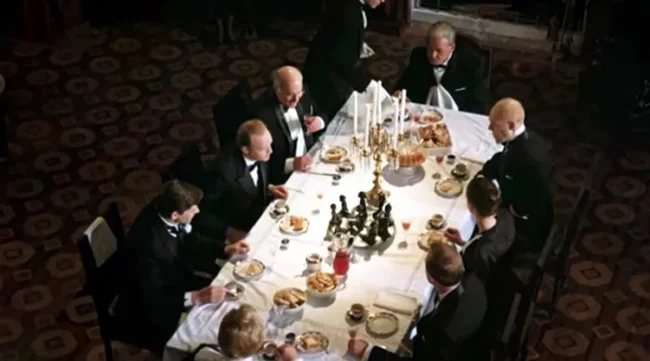
At Mr. Owen's invitation, eight strangers arrive at his house. At the mansion, servants are already waiting for them - a married couple. The very first dinner together is overshadowed by a recorded record on which, instead of music, a certain person accuses everyone present of a crime.
All of them are united not only by breaking the law, but also by the fact that they all managed to escape punishment. It is obvious that someone is taking justice into their own hands and punishing each of them in turn. Thanks to color, atmosphere and music, Stanislav Govorukhin’s film manages to keep the viewer in suspense, even when there is a regular dialogue between the characters on the screen.
Fact: the Soviet thriller, filmed on the eve of perestroika, simply could not do without love scenes. To the disappointment of the filmmakers, Agatha Christie did not write anything like this in the novel. Therefore, despite the title of an accurate film adaptation, the director arbitrarily introduced a new line into the plot, bringing Vera Claytron (Tatyana Drubich) into the bedroom of Philip Lombard (Alexander Kaidanovsky) at night. The writer herself also once changed her book when she adapted it for the stage - the author kept the same two characters alive.
"Death and the Maiden" (1994)
The film Death and the Maiden is set in an unnamed South American country where a dictatorial regime has only recently fallen. According to some guesses, this is Chile. Indirect confirmation was that the scriptwriter, Ariel Dorfman, is Chilean. In addition, in the picture you can see a poster of a Chilean poet and the national currency, the peso, flashes. 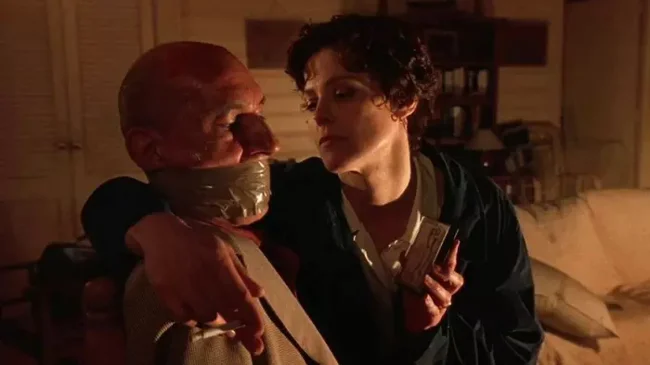
The plot is based on a chance meeting that revives tragic memories. Housewife and wife of a successful lawyer, Paulina (Sigourney Weaver), recognizes her neighbor, Dr. Roberto Miranda (Ben Kingsley), as the rapist who abused her during the fascist regime. But Paulina cannot prove anything, because the criminal prudently put a mask over her eyes.
The woman identified the rapist by his voice, favorite expressions and smell. Paulina is sure that this is her tormentor. But the law will not help, so she decides to force a confession about what she did from the doctor herself. Even her husband is ready to help her. The main thing is that Paulina doesn’t make a mistake.
Fact: despite the star cast and director Roman Polanski, the film failed at the box office - with a budget of $12 million, it grossed just over $3 million. However, critics praised the talented performances of the actors, who were not the director’s first choice: he himself wanted Jack Nicholson and Anjelica Huston to star in the film.
“Death and the Maiden” is the title of a composition by Schubert, whose record was played by a criminal who mocked his victim.
"A Time to Kill" (1996)
The thriller “A Time to Kill” is based on the book of the same name by John Grisham. The novel became the debut for the author and was inspired by real events. A lawyer by training, Grisham once witnessed the testimony of a 12-year-old rape victim. The girl and her older sister were attacked by two men.
The writer was struck by the tragic story, and this inspired him to write a novel. True, in reality, the victims of the attack were white, and their offenders were dark. In the book, Grisham did the opposite. 
Tonya Haley is a girl who was brutally attacked by two men. The criminals beat her, rape her and try to kill her. The girl survives, but the police catch the rapists. It would seem obvious, but state law does not provide for the death penalty for rape. What makes matters worse is that the victim is African-American and her tormentors are white.
At the trial, the victim's lawyer, Jake Brigance (Matthew McConaughey), tells the victim's father, Carl Lee Haley (Samuel L. Jackson), that the criminals can get out of the case and go free. Realizing that the rapists cannot be punished legally, the girl’s father kills them. The jury will now decide to convict Haley, who faces the death penalty.
Fact: despite the good box office (the film grossed $152 million against a budget of $40 million), the film was condemned by many. The authors of the film especially suffered from French human rights activists - they destroyed the film even for hinting that someone was given the right to kill.
"The Purge" (2013)
The idea for The Purge (original title: The Purge) belongs to James DeMonaco. He also acted as the director of the first three parts of the thriller. In an interview, Demonaco admitted that one of the sources of inspiration was the Japanese film “Battle Royale”.
But his wife played the main role in the creation of the film. One day, the couple almost died due to the fault of a drunk driver who caused an accident on the freeway. When Demonaco realized that the culprit was not even worried about what had happened, he attacked him with his fists. The police had to intervene. A little later, the director's wife said that it would be nice if everyone had the legal right to one murder a year. The “sweet” woman gave birth to the idea of a future film in the author’s head. 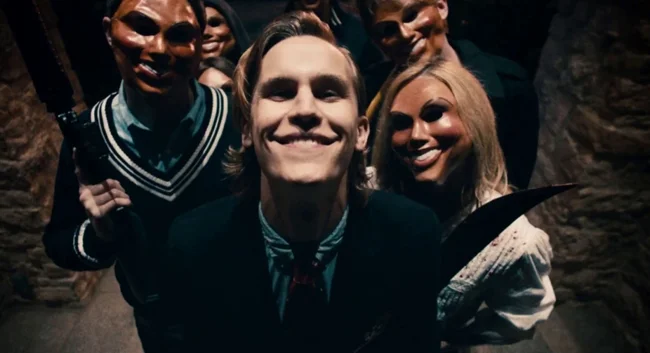
It's 2022, a totalitarian party has come to power in the United States, which has a very specific way of fighting crime and unemployment - once a year the government declares a night on which it is allowed to commit any crimes. For several hours, the country's residents are left to their own devices - no rescue services are working.
James Sandin (Ethan Hawke) and his family live in a wealthy area and are confident that Judgment Night will not affect them. But not at this time. A random stranger ends up in their house, and the “cleaners” of society come after him. The Sandin family becomes embroiled in the incident, but it turns out that they themselves have become targets for disgruntled neighbors.
Fact: a low-budget thriller could hardly count on star names in the cast. It was only out of friendship that Ethan Hawke agreed to star in the film. The actor was paid only 3 thousand dollars for the work and was promised a percentage of the proceeds, which then seemed very illusory. “The Purge” more than paid for itself at the box office - with a budget of $3 million, the film earned almost $90. It was immediately decided to shoot a sequel. At the moment, four films have already been released, and a fifth, “The Purge Forever,” is planned for July 2021.
"Lipstick" (1976)
For the 1970s, the theme of the thriller Lipstick was quite risque. The film raised the topic not only of revenge, but also of attitudes towards women who make money from their appearance: fashion models, fashion models. For society, these professions were associated with prostitution. 
Chris McCormick (Margot Hemingway) is a successful fashion model whose lipstick advertising posters are plastered all over the city. She has dozens of fans. Among them is her younger sister Katie's (Mariel Hemingway) music teacher, Gordon Stewart (Chris Sarandon). He is on good terms with the McCormick sisters and is welcome into their home.
On one such visit, he tries to seduce Chris, but she refuses him, which causes aggression. Stewart rapes the girl, and at the trial states that she herself wanted intimacy and everything was by consent. The word of the teacher against the word of the fashion model - the court frees the rapist. Chris is broken. She quits her job and is already planning to move - but finds out that Stuart also raped her younger sister. No longer relying on the law, the girl takes up arms.
Fact: the film became the debut work for the Hemingway sisters, the granddaughters of the famous writer. The eldest, Margot, worked as a model before filming. She is the first person in this area to sign a million-dollar advertising contract. But her career was short-lived: in 1996, like her famous grandfather, she committed suicide.
In a world ruled by lustful pedophiles, orphans are responsible for justice. A group of rich people, including State Duma deputies, arrives at the orphanage in expensive cars. They came to have fun with the children. Adults “close” their eyes to what is happening and turn away. The orphans are saved from violence by the pupils of another orphanage, who brutally deal with their tormentors.
The general public becomes aware that the “Children” gang is operating in the city, which takes revenge on adults whose crimes are not punished by the law. If in the film the actions of the orphans clearly evoke sympathy from those around them, then the viewer has a very ambivalent feeling - it’s scary to imagine that these children will decide whose actions deserve punishment and who they will allow to live.
Fact: The film received mixed reactions and was not released widely. Critics accused the author of justifying and even to some extent glorifying the actions of children. The press wrote about the one-sided presentation of the idea and the inexpressiveness of the main characters.
